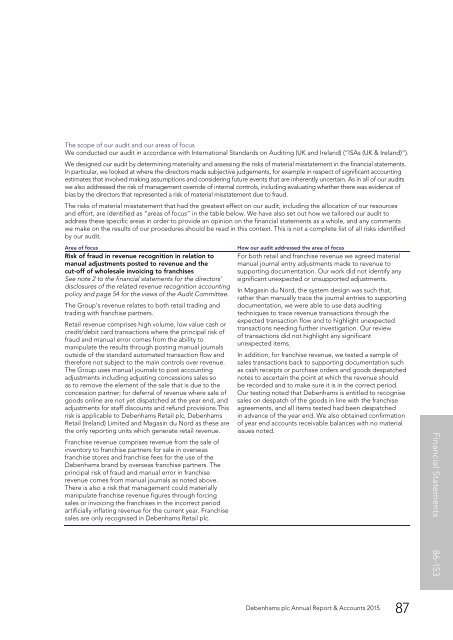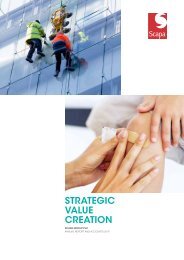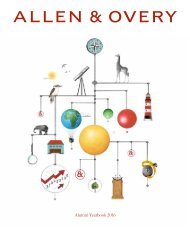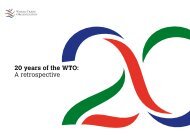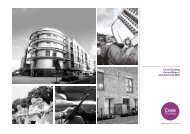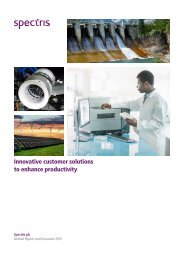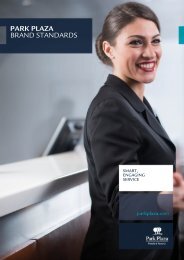20495_Debenhams_AR_151104
Create successful ePaper yourself
Turn your PDF publications into a flip-book with our unique Google optimized e-Paper software.
The scope of our audit and our areas of focus<br />
We conducted our audit in accordance with International Standards on Auditing (UK and Ireland) (“ISAs (UK & Ireland)”).<br />
We designed our audit by determining materiality and assessing the risks of material misstatement in the financial statements.<br />
In particular, we looked at where the directors made subjective judgements, for example in respect of significant accounting<br />
estimates that involved making assumptions and considering future events that are inherently uncertain. As in all of our audits<br />
we also addressed the risk of management override of internal controls, including evaluating whether there was evidence of<br />
bias by the directors that represented a risk of material misstatement due to fraud.<br />
The risks of material misstatement that had the greatest effect on our audit, including the allocation of our resources<br />
and effort, are identified as “areas of focus” in the table below. We have also set out how we tailored our audit to<br />
address these specific areas in order to provide an opinion on the financial statements as a whole, and any comments<br />
we make on the results of our procedures should be read in this context. This is not a complete list of all risks identified<br />
by our audit.<br />
Area of focus<br />
Risk of fraud in revenue recognition in relation to<br />
manual adjustments posted to revenue and the<br />
cut-off of wholesale invoicing to franchises<br />
See note 2 to the financial statements for the directors’<br />
disclosures of the related revenue recognition accounting<br />
policy and page 54 for the views of the Audit Committee.<br />
The Group’s revenue relates to both retail trading and<br />
trading with franchise partners.<br />
Retail revenue comprises high volume, low value cash or<br />
credit/debit card transactions where the principal risk of<br />
fraud and manual error comes from the ability to<br />
manipulate the results through posting manual journals<br />
outside of the standard automated transaction flow and<br />
therefore not subject to the main controls over revenue.<br />
The Group uses manual journals to post accounting<br />
adjustments including adjusting concessions sales so<br />
as to remove the element of the sale that is due to the<br />
concession partner; for deferral of revenue where sale of<br />
goods online are not yet dispatched at the year end, and<br />
adjustments for staff discounts and refund provisions.This<br />
risk is applicable to <strong>Debenhams</strong> Retail plc, <strong>Debenhams</strong><br />
Retail (Ireland) Limited and Magasin du Nord as these are<br />
the only reporting units which generate retail revenue.<br />
Franchise revenue comprises revenue from the sale of<br />
inventory to franchise partners for sale in overseas<br />
franchise stores and franchise fees for the use of the<br />
<strong>Debenhams</strong> brand by overseas franchise partners. The<br />
principal risk of fraud and manual error in franchise<br />
revenue comes from manual journals as noted above.<br />
There is also a risk that management could materially<br />
manipulate franchise revenue figures through forcing<br />
sales or invoicing the franchises in the incorrect period<br />
artificially inflating revenue for the current year. Franchise<br />
sales are only recognised in <strong>Debenhams</strong> Retail plc.<br />
How our audit addressed the area of focus<br />
For both retail and franchise revenue we agreed material<br />
manual journal entry adjustments made to revenue to<br />
supporting documentation. Our work did not identify any<br />
significant unexpected or unsupported adjustments.<br />
In Magasin du Nord, the system design was such that,<br />
rather than manually trace the journal entries to supporting<br />
documentation, we were able to use data auditing<br />
techniques to trace revenue transactions through the<br />
expected transaction flow and to highlight unexpected<br />
transactions needing further investigation. Our review<br />
of transactions did not highlight any significant<br />
unexpected items.<br />
In addition, for franchise revenue, we tested a sample of<br />
sales transactions back to supporting documentation such<br />
as cash receipts or purchase orders and goods despatched<br />
notes to ascertain the point at which the revenue should<br />
be recorded and to make sure it is in the correct period.<br />
Our testing noted that <strong>Debenhams</strong> is entitled to recognise<br />
sales on despatch of the goods in line with the franchise<br />
agreements, and all items tested had been despatched<br />
in advance of the year end. We also obtained confirmation<br />
of year end accounts receivable balances with no material<br />
issues noted.<br />
Strategic Report 1-37 Governance 38-58 Financial Statements XX-XX 86-153<br />
87<br />
<strong>Debenhams</strong> <strong>Debenhams</strong> plc Annual plc Annual Report Report & Accounts & Accounts 2015 2015<br />
87


